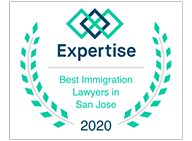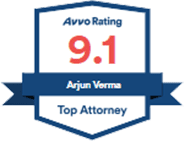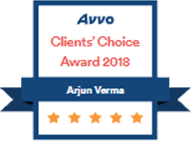
H1B Visa Lawyer in San Jose
Verma Law Firm Has the Experience You Need

The most popular of the H-Visa category is the H1B visa. The H1B visa is a non-immigrant visa that permits U.S. employers to employ foreign nationals in specialty occupations for a temporary period. A person may hold H1B status for a maximum of six years and may be eligible for extensions beyond the six-year limit under certain circumstances. At Verma Law Firm, our H1B visa lawyer in San Jose, CA, will help you through your immigration matters.
The complexity of the H1B application process often necessitates personalized legal guidance to navigate the intricate details involved. We provide tailored services to ensure your application is thorough and meets all the requirements without unnecessary delays. Our deep understanding of U.S. immigration law paired with our commitment to each client's unique needs makes us a preferred choice for those needing an H1B visa attorney in San Jose.
What Are the Different Types of H Visas?
- H1B (specialty occupation)
- H1B1 (specialty occupations from Singapore and Chile)
- H1C (Professional Nurses Working in Health Professional Shortage Areas [HPSAs])
- H-2A (temporary agricultural workers)
- H-2B (skilled/unskilled workers where US Citizens and Permanent Residents are not available)
- H-3 (trainees)
- H-4 (accompanying family members of H visa holders)
Each of these visas serves a distinct purpose and caters to various employment needs across industries. Understanding each type's specific eligibility criteria and application intricacies can be vital to acquiring the correct visa for your situation. Our firm is adept at handling all these different visa types, offering advice tailored to your particular career or family situation.
What Are the Benefits of an H1B Visa?
One of the most desirable features of an H1B visa is its recognition of “dual intent,” meaning that an H1B worker can apply for a Green Card and become a permanent resident without having his or her H1B visa denied or revoked. H1B visas are advantageous to foreign nationals seeking specialized employment in the U.S. H1B visas are numerically limited for each fiscal year. This limitation is set by Congress and commonly referred to as the H1B Cap. For example, the statutory cap for the fiscal year 2016 was 65,000, with an additional 20,000 for aliens who obtained a U.S. master’s degree or higher.
The dual intent feature of the H1B visa significantly eases the transition process for employees who wish to eventually obtain permanent residency. Furthermore, the demand for highly skilled professionals continually increases in the U.S., and the H1B visa provides a pathway for these individuals to contribute to numerous industries, especially in thriving areas such as Silicon Valley. By leveraging this visa, professionals have the opportunity to enhance their careers while contributing to the U.S. economy.
Generally speaking, alien workers cannot petition for H1B status for themselves. The sponsoring U.S. employer must file the H1B petition for the foreign worker. Therefore, the U.S. employer is usually referred to as the petitioner, while the foreign worker is referred to as the beneficiary. To qualify for an H1B visa, the sponsoring employer and potential employee must meet specific requirements set forth by USCIS and the Department of Labor.
These requirements include:
- The employee must be employed in a specialty occupation, meaning that the employee must have earned a U.S. Bachelor’s or higher degree or equivalent (the minimum requirement for entry into an H-1B occupation is a four-year U.S. Bachelor’s degree or equivalent in a specific field);
- There must be an employer-employee relationship between the sponsoring U.S. employer and the foreign worker; and
- A Labor Condition Application certified by the Department of Labor must be submitted with the H1B petition.
The process of securing an H1B visa is highly competitive due to the annual cap, making it imperative for applicants and their employers to prepare comprehensive petitions. This involves detailed documentation and supporting evidence that demonstrate expertise and contribution to the intended U.S. employment. Our firm is equipped to guide both employers and employees through this detailed process, ensuring all aspects of the application are meticulously handled.
The spouse and minor children of an H1B employee can stay in the U.S. on H-4 status. In general, they can study but are not permitted to work. However, under new regulations that went into effect on May 26, 2015, certain spouses on H-4 status are now eligible to apply for employment authorization in the U.S.
Those eligible to apply for employment authorization are H-4 dependent spouses of H1B visa holders who:
- Have an approved Form I-140; or
- Have been granted an extension of stay beyond the six-year H1B visa limit under AC21 (American Competitiveness in the Twenty-First Century Act of 2000) based on a pending PERM Labor Certification application or a Form I-140 application that has been pending adjudication for more than 365 days.
The inclusion of employment authorization for H-4 dependents marks a significant development, offering new economic opportunities to families of H1B visa holders. This enhancement not only aids in maintaining family unity but also strengthens the financial stability of immigrant families living and working in the U.S., allowing for a more seamless integration into American society.
How to Apply for an H1B Visa
The H1B work visa requires a U.S. employer to sponsor you for your application. If you have been hired by a U.S. employer, it is important to ensure that employer will be willing to be your sponsor.
After you are hired, your employer will submit a "Labor Conditions Approval" document to the Department of Labor. This informs the DOL of the factors and requirements of your job, including location and pay. This also ensures that you as an employee will receive a wage that is at least equivalent to the average wage for your position in the area.
Once the LCA is approved, careful steps must be taken to prepare the I-129 form, which is a formal request for H1B employment. This form requires detailed information about the job, the candidate qualifications, and the employer. Any errors or omissions can lead to delays or denials, which is why precision and thoroughness in the application process is crucial. Our legal team supports clients in assembling and reviewing each component of the application to avoid these pitfalls.
After the approval of the LCA, the employer will file a Petition for a Nonimmigrant Worker, also known as Form I-129. Processing for this petition can take up to four months, though there is premium processing available for an additional cost.
Finally, once this petition is approved, you, as the applicant, must process your visa at the appropriate embassy office or consulate.
Navigating the consular process is the final step in securing your H1B visa. It's essential to gather all necessary documents and prepare for potential interviews at your local U.S. embassy or consulate. Being well-prepared can significantly impact the outcome of your application. Our firm provides comprehensive support to ensure that this final phase runs smoothly.
Choosing Our H1B Visa Lawyer in San Jose, CA
Our firm has a team of experienced immigration attorneys and staff members who can help you navigate the complex U.S. immigration laws. Verma Law Firm will ensure that your H1B petition process goes smoothly and will maximize the chance of your H1B approval. Please contact us for more information or schedule a legal consultation.
Choosing the right legal partner is crucial in the competitive landscape of H1B applications. With our strategic location in San Jose, we are ideally placed to serve clients in the bustling tech industry of Silicon Valley. Our comprehensive approach ensures that we address both the legal and procedural nuances, providing peace of mind and a pathway to success in your immigration journey.
Understanding H1B Visa Trends in Silicon Valley
The H1B visa program is particularly significant in tech-centric areas like Silicon Valley, a hub for innovation and technological advancement. The demand for skilled workers in STEM fields often outpaces the supply of qualified U.S. citizens, making the H1B visa a critical tool for local employers. Companies in San Jose and surrounding areas rely on this visa to maintain a competitive edge in fields like software development, engineering, and data science.
The sheer number of tech companies established here creates a robust network that supports visa applicants by providing sponsorships and career opportunities. However, the high demand also means companies must be at the forefront of crafting attractive and compliant visa packages to stand out to potential employees.
In recent years, there has been increased scrutiny and evolving regulations impacting the H1B visa process, necessitating a more strategic approach in applications. Employers and applicants must stay informed about annual cap limits, lottery selections, and policy changes that could affect application outcomes. Our firm stays ahead of these trends, guiding clients through the shifting landscape with expert knowledge and proactive strategies.
Benefits of Working With a San Jose H1B Visa Attorney
Working with an H1B visa attorney located in San Jose offers unique advantages, including local industry insight and proximity to resources beneficial for applicants. Our firm is well-versed in the specific challenges and opportunities that applicants face in the Silicon Valley region. By choosing a local attorney, clients benefit from personalized service that factors in regional economic conditions, common regulatory challenges, and local tech industry demands.
Due to our strong connections within the local business community, we can provide guidance that aligns with the expectations and standards of Silicon Valley's top employers. Understanding the priorities of these employers ensures that applications resonate with the companies' goals and compliance expectations. From preparing documentation to managing timelines, our firm simplifies the process, allowing clients to focus on their professional goals and opportunities.
Don't wait to get help! Contact our firm today by calling us at (408) 560-4622.
Frequently Asked Questions About H1B Visas
What Are the Cap Restrictions on H1B Visas?
The H1B visa cap refers to the annual limit set by U.S. Congress on the number of H1B visas that can be issued each fiscal year. Currently, the cap is set at 65,000 visas, with an additional 20,000 reserved for applicants who have obtained a master's degree or higher from a U.S. institution of higher education.
This cap does not apply to all applicants; exemptions are available for certain non-profit, higher education institutions, and government research organizations. However, for most profit-driven enterprises, the cap represents a significant hurdle as demand for these visas typically exceeds the supply, often leading to a lottery system to determine who receives them.
The cap's limitations mean that early planning and strategic application submission are crucial. Employers must be proactive, and applicants must ensure they meet all requirements ahead of time. Our team assists clients in understanding their applicant category, cap status, and how they can maximize their chances of securing a visa amidst these restrictions.
How Does the H1B Visa Lottery System Work?
When the number of H1B visa applications exceeds the cap, U.S. Citizenship and Immigration Services (USCIS) implements a lottery system to randomly select the applicants who will receive the visas. This process first selects from the master's cap of 20,000 visas and then proceeds to the general 65,000 cap. It is important to note that being selected in the lottery does not guarantee a visa approval, as each selected application must still undergo a thorough vetting process by USCIS.
Our firm helps clients prepare comprehensive applications that meet all regulatory requirements to improve their odds of success in this competitive environment. We provide guidance on gathering necessary documentation and meeting compliance standards, which is crucial given the high stakes of the lottery system.
What Happens If My H1B Visa Application Is Denied?
If an H1B visa application is denied, the applicant will receive a notice explaining the reasons for the denial. Common reasons include insufficient evidence of a specialty occupation, lack of qualifications by the beneficiary, or issues with the labor condition application. Applicants have several options following a denial, such as reapplying in the next filing period, addressing identified issues, or exploring alternative visa options based on their eligibility.
Our firm assists individuals with understanding the reasons behind the denial and strategizing next steps. We analyze each case based on its specifics and work towards crafting a more compelling resubmission or identifying other pathways, such as O visas for extraordinary ability or L visas for intercompany transfers.
How Long Can I Stay in the U.S. on an H1B Visa?
An H1B visa is initially granted for a period of up to three years, extendable to a maximum of six years. Extensions beyond six years are possible under specific circumstances, such as if the applicant has a pending or approved I-140 immigrant petition and meets other requirements under the American Competitiveness in the Twenty-First Century Act (AC21). This act allows individuals to continue working in the U.S. while their permanent resident application processes.
Navigating extensions and understanding qualifying conditions require adept management, as maintaining valid extension status is essential for continuous employment and residency. Our team provides comprehensive support for H1B visa renewals and guides clients on maintaining compliance with all immigration regulations.
Can H1B Visa Holders Change Employers in the U.S.?
Yes, H1B visa holders can change employers in the U.S. through a process known as H1B transfer. The new employer must file a new Form I-129 petition on behalf of the worker before they can begin working for the new employer. It's important to file this petition quickly because the law allows the H1B worker to begin employment with the new employer as soon as USCIS receives the petition.
Our firm assists clients in smooth transitions between employers by ensuring that all transfer paperwork is accurately completed and promptly filed. We work closely with both employees and employers to streamline this process, navigate any complexities, and ensure compliance with all immigration policies. Our goal is to provide seamless support that minimizes disruptions for our clients during these transitions.
H1B Visa Related Issues:
- Public Access File
- H1B Cap-Gap
- Offsite H1B Employees
- H1B Visa for Physical Therapist
- USCIS Guidance on Adjudication of H1B Petitions Filed on Behalf of Nurses
- Filing Amended H1B Petition When Worksite Changes
- Splitting H1B Filing Fees and Legal Fees with Employees
- Recapture of Unused H1B Time
- H1B Extension Beyond Six Years and AC21
- H1B Portability and AC21
- H1B Layoffs
- Spouses of H1B Nonimmigrant Workers May Be Able to Work in the U.S.
- USCIS Released Proposed Rule on Employment Authorization for Certain H-4 Spouses
- Visa Alternatives to H1B
- Temporary Transfers and Short-Term Placement in Regard to H1B Workers
- H1B Cases: RFE Trends
- Employer Held Personally Liable for Back Wages and Expenses of Obtaining H1B and J-1 Waivers
USCIS Memoranda:
- INS Directive on H1B Travel and AC21. Michael A. Pearson Memo dated Jan. 29, 2001
- USCIS Letter Addresses Travel After Change of Status
- DOL Finds Filing & Attorney Fees Must Be Paid by Employer
- Amended H1B Not Required if LCA Certified Prior to Move
- USCIS Memo re Mexican TN Visas & Singapore/Chile Free Trade H1B and E Visas
- List of Customs & Border Protection Bureau (CBP) Deferred Inspection Offices for Correction of Erroneous Form I-94s
- Changes to the NSEERS Program, DHS Issues a Fact Sheet, FAQs and Press Release.
- Department of State (DOS) to End Revalidation of Visas in the US
- Electronic I-9 Signature and Storage Bill Signed into Law
- USCIS Memo re H1B & L-1 Visa Holders Being Allowed to Recapture All the Days Spent Outside the US
- USCIS Memo Dated 12/05/2006 on Periods of H & L Admissions
- USCIS Memo (09/23/2005) re Interim Guidance Regarding the Impact of the Department of Labor's (DOL) PERM Rule on Determining Labor Certification Validity, Priority Dates for Employment-Based Form I-140 Petitions, Duplicate Labor Certification Requests and Requests for Extension of H1B Status Beyond the 6th Year
- USCIS Memo Regarding AC21 Issues
- USCIS Memo Rescinds Memo on Denials Without RFE and New Instructions on RFEs
- USCIS Announces Direct Filing Instructions for Form I-129F, I-131, I-140, I-360, I-485, I-765 and I-907
- USCIS Memo (06/18/2001) Travel After Filing a Request for a Change of Nonimmigrant Status
- Update Regarding New PIMS System

Trusted & Highly Recommended
See What Our Clients Have to Say
-
Arjun Verma was great to work with.
Arjun Verma was great to work with. He helped my husband and I file for his permanent residence. He was very knowledgeable ...
Amanda -
Approval of Green Card (CP) at Chennai US Consulate.
Dear Arjun: Good Morning to you. I would like to take this opportunity to thank you and all your associates for all the help ...
Anil R. Bolleddu -
You are THE BEST ...
Thank You for excellent work you guys have done. You are THE BEST ... We strongly recommend your expertise to everyone and ...
Renu / Amarjit



